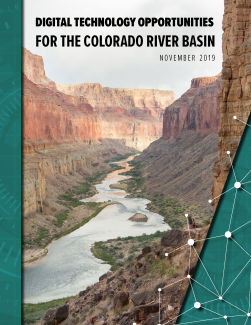Unraveling the Environmental Impacts of our Digital Lives / Sloan Foundation Funds New Research
(Washington, D.C.): The Alfred P.
Internet Society Foundation Funds New Research on the Environmental Footprint of the Digital Economy
(Washington, DC): Digital technologies are rapidly transforming the way we access and process information, impacting the global economy and our social dynamics. These dramatic changes have important environmental and energy implications, yet a dearth of research in the field leaves decisionmakers in an information void that can impact public policies, business decisions, and consumer choices.
Unpacking the Bioeconomy: A Closer Look at What’s on the Market and What’s Coming
(Washington, DC): This week, thousands of people will convene (virtually) for the Global Bioeconomy Summit, a biennial event normally held in Berlin to discuss emerging opportunities and challenges of the bioeconomy. Many anticipate the biotechnology market to be worth US$727.1 Billion by 2025, so events like these are capturing the increased attention and active involvement of government agencies that may be key to driving growth in multiple economic sectors in the future.
New Reports Offer Best Practices for Citizen Science Programs
(Washington, DC): Citizen science—the gathering of data by non-professionals— is gaining traction as a tool in environmental protection. Citizen science is used to assess the impairment of rivers, lakes and streams, monitor air quality at a hyperlocal scale, and report regulatory non-compliances. Not surprisingly, environmental agencies at the state, tribal and local level are increasingly transforming their approach to citizen science. The Environmental Law Institute was commissioned by the U.S.
How Green Is the Digital Economy? New Research Sheds Light on Energy and Environmental Impacts of Artificial Intelligence, Blockchain and Sharing Platforms
(Washington, DC): Digital technologies have steadily woven themselves into the global economy, transforming the pace at which we access and process information. According to the Bureau of Economic Analysis, the digital economy accounted for 9% of the U.S. gross domestic product in 2018. Now the fourth largest sector in the United States, digital services are rapidly expanding our energy and environmental footprint while promising broad societal benefits. For example, can sharing platforms help reduce food waste? Does ride-hailing generate more greenhouse gas emissions?
3D-Printers and Maker-Spaces: Improving Health and Environmental Sustainability Through Voluntary Standards

This report is the culmination of a three-month investigation into the nature of 3d-printing with regards to potential social and environmental implications. Three graduate students from the Sustainability Innovation MBA program at the University of Vermont teamed up with members of the Environmental Law Institute to identify these implications and offer recommendations for sustainability within the specific sector of maker-spaces in the 3d-printing industry.
Digital Technology Opportunities for the Colorado River Basin

The American West, including the cities of Las Vegas, Nevada; Los Angeles, California; Phoenix, Arizona; and Denver, Colorado, falling under the reaches of the greater Colorado River Basin (CRB), is now among the world's water stressed regions facing the environmental, economic, and social challenges of increased water scarcity. The CRB supplies more than 1 in 10 Americans with some, if not all, of their water for municipal use, including drinking water.
Digital “Cards Against Calamity” A Finalist at the 2019 G4C Awards
(Washington, D.C.)—The Environmental Law Institute (ELI) is excited to announce that Cards Against Calamity, a digital game created by 1st Playable in partnership with ELI and NOAA Fisheries, is a finalist for the 2019 G4C Awards in the “Best Learning Game” category. Finalists were selected by ex
A History of EPA's Regulation of Pesticide Use on Cannabis

In recognition of the numerous sustainability challenges linked to cannabis cultivation, the Environmental Law Institute’s Innovation Lab teamed up with pesticide law and cannabis law experts to create multiple educational brochures demystifying the confusing regulatory landscape of pesticide use on cannabis. Make sure to check out our other brochures: Pesticide Compliance in the Cannabis Industry; Pesticide Use in the Cannabis Industry.
